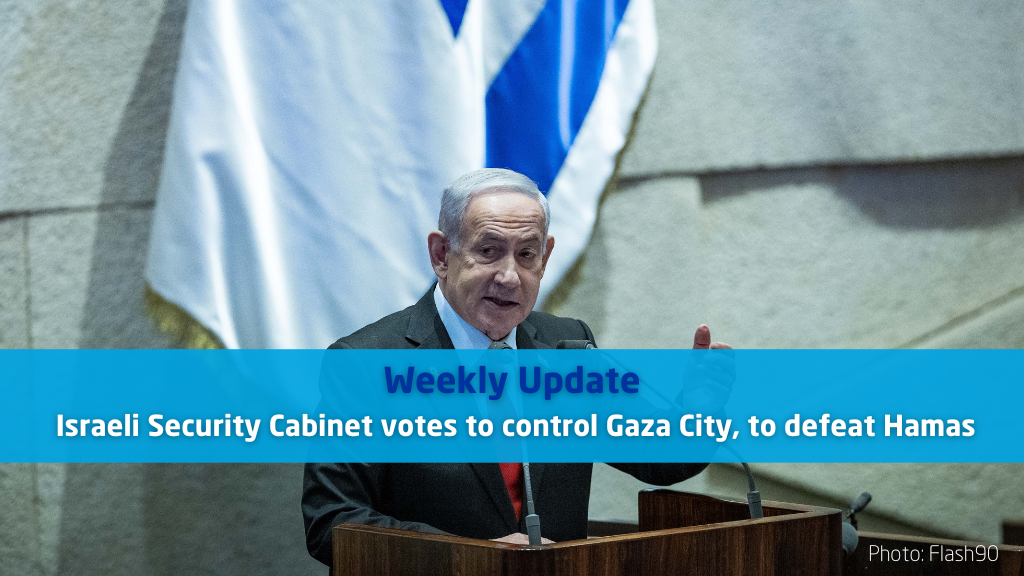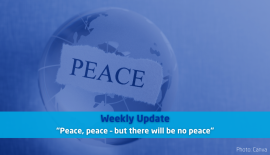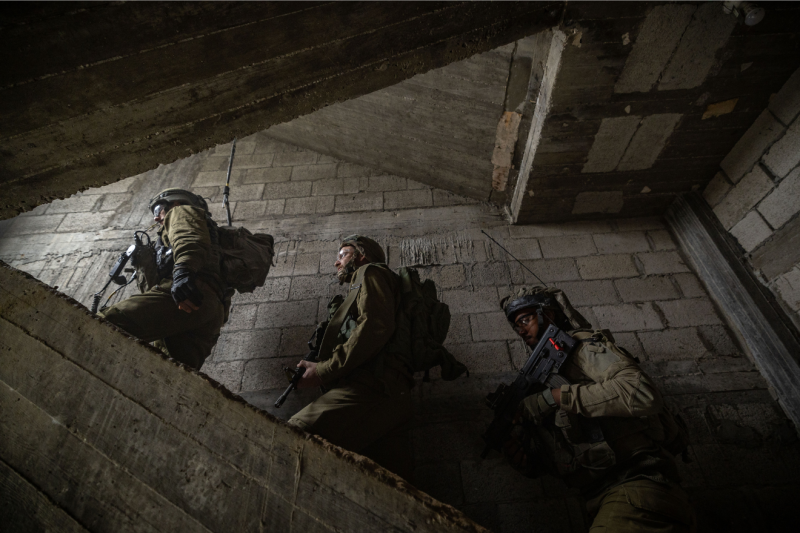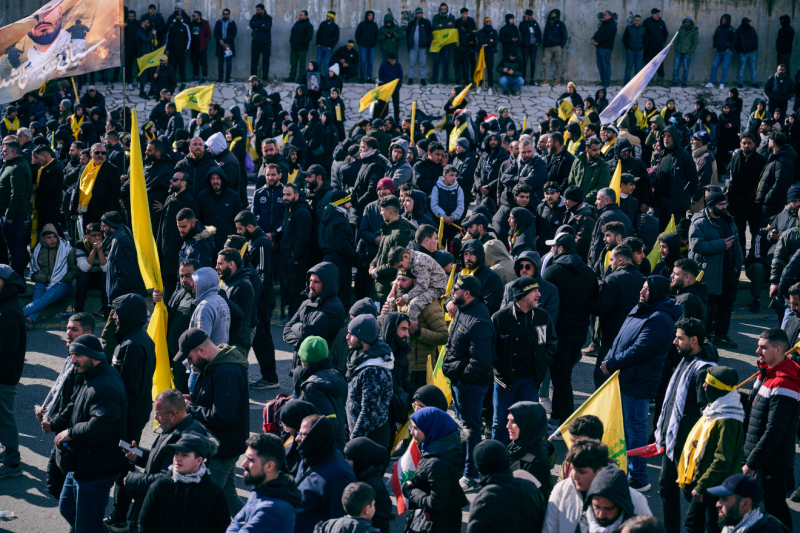Israeli Security Cabinet votes to control Gaza City, to defeat Hamas
The Israeli Security Cabinet has approved Prime Minister Benjamin Netanyahu’s comprehensive plan to defeat Hamas and establish control over Gaza City, with a decisive majority rejecting alternative proposals as ineffective.
The strategy includes disarming Hamas, recovering hostages, demilitarizing Gaza, and implementing Israeli security oversight. A key component is the creation of a new civilian administration unaffiliated with Hamas or the Palestinian Authority. Netanyahu emphasized that Israel does not seek a long-term occupation of Gaza but aims to eventually transfer authority to non-hostile Arab entities.
Humanitarian aid efforts are expanding in parallel with military operations. The Gaza Humanitarian Foundation (GHF) has increased food distribution sites and extended operating hours to meet growing needs. U.S. Congressman Josh Gottheimer (D-N.J.), part of a bipartisan delegation visiting Israel, affirmed Netanyahu’s commitment to avoiding permanent rule over Gaza. After meeting with the Prime Minister and touring the Kerem Shalom crossing and a GHF site, Gottheimer observed substantial aid deliveries and praised GHF’s orderly distribution system.
He condemned Hamas for looting 88 percent of U.N. aid trucks and profiting from stolen supplies, reportedly earning $500 million last year. Former U.S. Ambassador David Friedman defended Israel’s actions, citing Hamas’s refusal to surrender and the absence of a hostage deal. Both Friedman and Gottheimer criticized international actors for withdrawing support and warned against misinformation campaigns that distort global perception. Netanyahu framed the operation as a liberation effort—for both Israelis and Gazans—from Hamas’s oppressive rule.
Between Illusion and Imitation – The IDF and the West’s War Dilemma
General Yoav Galant and military analyst John Spencer describe the hypocrisy of Western democracies.
The Israel Defense Forces (IDF) face intense public criticism, yet remain a key source of military insight for Western defense officials. Behind closed doors, generals actively seek Israeli expertise in urban warfare, intelligence integration, and strategies for minimizing civilian harm—even as political leaders publicly condem Israel’s actions. This disconnect reveals a deeper divide between political messaging and operational realities.
Since the Gaza war began, foreign delegations have visited Israel to study its military tactics. They ask detailed questions and often seek formal cooperation. Meanwhile, political leaders emphasize restraint and precision, ignoring the complexities of confronting a hybrid enemy embedded within civilian areas. Hamas deliberately uses civilian infrastructure—schools, hospitals, mosques—as shields. It blocks evacuations, hides command centers in humanitarian zones, and takes hostages. These are not incidental acts, but strategic choices aimed at provoking international condemnation and complicating the responses of democratic states.
International reactions remain inconsistent. While Israel conducts both combat and humanitarian operations, Egypt has kept its border closed, refusing to offer refuge. Yet no major international body has pressured Cairo to open evacuation routes; criticism remains disproportionately focused on Israel.
Democracies must regain strategic clarity. War—though tragic—can be both lawful and necessary. The IDF operates under legal constraints, even as its adversaries routinely violate them. Political leaders often avoid confronting hard truths, portraying war as inherently unjust or always avoidable through diplomacy alone. This narrative distorts public understanding and emboldens enemies.
Israel’s reality is both immediate and existential. The October 7 attacks, which killed 1,200 Israelis, underscore the urgency of self-defense. Democracies must align public discourse with operational realities. Illusions and selective outrage do not protect civilians or deter threats—they invite failure. Military leaders understand these truths. It is time for political leaders to confront them—honestly, consistently, and with strategic resolve.”
The Media Front in the War Against Civilization
Journalistic fraud has been committed in the service of a very great evil.
Western media has played a central role in amplifying Hamas propaganda, shaping a global narrative that vilifies Israel and obscures the realities of the Gaza conflict. Investigations by German outlets have uncovered that some widely circulated images—depicting allegedly starving Gazans—were staged by photographers with known ties to Hamas. One such individual, Anas Zayed Fteiha, whose work has appeared in major international publications, has a documented history of anti-Israel activism.
In Gaza, Hamas maintains tight control over image production, ensuring that visuals serve its political objectives. Western media outlets routinely publish Hamas-supplied casualty figures and footage, ignoring evidence of Hamas targeting civilians, stealing aid, and suppressing dissent. Photos of skeletal children, for example, have been misrepresented; many were suffering from congenital illnesses, not starvation. This manipulation reflects a deeper pattern of media bias. Former AP journalist Matti Friedman exposed how news organizations systematically omit positive stories about Israel and invert cause and effect to promote Palestinian victimhood. These narratives are further reinforced by NGOs, academic voices, and international institutions, creating a self-reinforcing echo chamber hostile to Israel.
Journalists in Gaza operate under Hamas censorship, with no freedom to report independently. Unrestricted access would likely increase propaganda. The persistent portrayal of Jews as villains taps into long-standing Western prejudices, which Hamas skillfully exploits. As a result, the media has become a tool in a broader cognitive war against Israel— serving extremist agendas and undermining truth and civilization.
US plan seeks to disarm Hezbollah by year-end, IDF to leave Lebanon
The United States has proposed a four-phase plan to disarm Hezbollah by the end of the year and facilitate the withdrawal of Israeli forces from Lebanon. The initiative, led by U.S. envoy Tom Barrack, aims to stabilize the ceasefire brokered in November 2023, after Hezbollah launched attacks on Israel in support of Hamas.
Phase 1 calls for the Lebanese government to formally commit to Hezbollah’s disarmament within 15 days, followed by a suspension of Israeli military operations.
Phase 2 involves the implementation of disarmament measures and the deployment of the Lebanese Armed Forces.
Phase 3 includes full IDF withdrawal and international support for reconstruction.
Phase 4 mandates the seizure of Hezbollah’s remaining heavy weapons, alongside an international economic conference to support Lebanon’s recovery.
Hezbollah has rejected the proposal outright. Secretary-General Naim Qassem accused Barrack of using intimidation tactics and declared Hezbollah’s readiness to confront Israel militarily. While Lebanese Prime Minister Nawaf Salam approved a national security plan aligned with the U.S. proposal, Hezbollah dismissed the government’s decision as illegitimate.
Let us pray for Israel’s leaders—both political and military—as they face immense pressure and complex decisions. Ask the Lord to grant them discernment, clarity, and courage to act justly and wisely.
Intercede for the people of Israel. May God’s peace which surpasses all understanding, guard their hearts and minds. Pray for healing, protection, and restoration throughout the land.
Pray that Christians around the world remain spiritually alert, recognizing the spiritual battle surrounding Israel. May we hold fast to the Word of God, measuring every headline against His truth, resisting false narratives, and standing firm in biblical conviction.
Let us be watchful, faithful, and prayerful — trusting that God is sovereign and that His promises endure.
By ‘decisive majority,’ Israeli Security Cabinet votes to control Gaza City, defeat Hamas
Netanyahu had said that Israel would control the entire Strip.
> Read more..
Netanyahu has ‘no interest in long-term Gaza occupation,’ Gottheimer says
After meeting with the Israeli prime minister, the New Jersey Democrat told JNS that Israel’s goal is to “crush Hamas” and seek a multinational governance structure for the enclave.
> Read more..
Between Illusion and Imitation – The IDF and the West’s War Dilemma
No military is more publicly condemned today than the Israel Defense Forces. Yet behind closed doors, few are more studied. Western generals and defense officials routinely seek Israeli briefings, request access to doctrine and tactics, and pursue cooperation on training and technology.
> Read more..
The media front in the war against civilization
Journalistic fraud has been committed in the service of a very great evil.
> Read more..
Bibi-bashing and the quest for a mythical middle way in Gaza
Israel lacks good options in the war against Hamas, but the condemnations of Netanyahu’s choice says more about his critics than about him.
> Read more..
Report: IDF bans Chinese cars from bases to prevent data leaks
The move follows a deterioration in Israel-China ties amid the war in Gaza and Western fears over espionage.
> Read more..
Israeli energy firm inks $35b gas deal, largest in Israel’s history
The deal will strengthen regional stability and Israeli energy security, said Yossi Abu, CEO of NewMed Energy.
> Read more..
Argentine documentary commemorates Bibas family, slaughtered in Gaza
The film, “Bibas: Murdered for Being Jewish,” represents the product of over a year of research and testimony collection.
> Read more..
In symbolic move, Slovenia bans West Bank settlement imports over war in Gaza
Meanwhile, ethics watchdog for Norway’s sovereign wealth fund says it should have considered divesting from firm servicing Israeli fighter jets
> Read more..
Most people across 24 surveyed countries have negative views of Israel and Netanyahu
International views of Israel and Prime Minister Benjamin Netanyahu are much more negative than positive, according to a Pew Research Center survey of 24 countries conducted this spring.
> Read more..
US plan seeks to disarm Hezbollah by year-end, IDF to leave Lebanon
The Iranian-backed terrorist group has rejected all proposals for its disarmament.
> Read more..
SCRIPTURE FOR THE WEEK:
Deuteronomy 7:6-9
6 For you are a people holy to the LORD your God. The LORD your God has chosen you out of all the peoples on the face of the earth to be His people, His treasured possession.
7 The LORD did not set His affection on you and choose you because you were more numerous than other peoples, for you were the fewest of all peoples.
8 But it was because the LORD loved you and kept the oath He swore to your forefathers that He brought you out with a mighty hand and redeemed you from the land of slavery, from the power of Pharaoh king of Egypt.
9 Know therefore that the LORD your God is God; He is the faithful God, keeping His covenant of love to a thousand generations of those who love Him and keep His commands.









